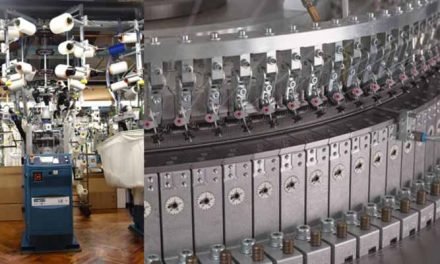 Working together, flat knitting machine specialist Shima Seiki and cellulosic fibre manufacturer Lenzing are demonstrating how Tencel Modal with indigo technology is proving an ideal partner for the production of Wholegarment knitwear.
Working together, flat knitting machine specialist Shima Seiki and cellulosic fibre manufacturer Lenzing are demonstrating how Tencel Modal with indigo technology is proving an ideal partner for the production of Wholegarment knitwear.
Based in Austria, the Lenzing Group recently announced their enhancement of sustainable offerings for the denim and knit industries with their newly developed Tencel Modal fibres with Indigo technology.
The new offering uses advanced technology to incorporate the indigo pigment directly into the Tencel branded modal fibres using a one-step, spun-dyeing process. This delivers superior colour-fastness relative to conventional indigo dyeing while using substantially fewer resources, Lenzing said.
This technology has been awarded the EU Ecolabel, a designation of environmental excellence given to products meeting high environmental standards throughout their life cycle.
Eco-responsible: The denim industry’s demand for eco-responsible alternatives is growing significantly, as brands and supply chain partners seek even more sustainability in various manufacturing processes. Lenzing has been working closely with like-minded partners to reverse environmentally harmful denim production processes through the origin of its raw materials and responsible production processes.
Denim remains an important market for Lenzing and the introduction of Tencel Modal with Indigo technology is designed to help reduce the ecological footprint of denim fabrics and garments. Produced in Austria, predominantly from beech wood derived from sustainably managed wood sources, the new offering has been designated BioPreferred by the United States Department of Agriculture (USDA).
“Innovation is at the core of what we do, from sustainable fibre sourcing through industry-leading features and production processes, with the ever-present goal of safeguarding our environment,” explained Florian Heubrandner, Vice President of the Global Textiles Business at Lenzing AG. “By upending traditional manufacturing processes and implementing our pioneering technology along with renewable and eco-responsible materials, Tencel Modal with Indigo technology sets a new benchmark for indigo application and sustainability in the denim industry.”
Tricia Carey, director of global business development for denim at Lenzing, agrees that indigo technology marks a major change in the way indigo dye has been applied that goes beyond foam dyeing, for example, and allows for fewer steps in the process and reduces chemicals by putting the indigo pigment into the yarn while it is being spun.
“I feel the opportunities are really endless for what can be done with this technology,” Carey says. “We feel this process will be able to stop problems, not only of indigo dyeing, but also in the knit market, which has had problems working with indigo yarns because of the crocking. The beauty of adding the indigo pigment into the fibre is that you still can create the wash effects in a commercial laundry–ozone, laser–however, when the consumer washes it in the home laundry, you will not have any further loss of colour.”
Carey notes that Tencel Modal fibres with Indigo technology are inherently versatile and enable implementation in a range of multifibre blends. She said the process also allows for the fibre to be used in products beyond jeans, such as knitwear, activewear, shoes, and home goods since the crocking is eliminated.
In addition, a specially commissioned indigo pigment from dyestuff manufacturer DyStar ensures that Tencel Modal with Indigo technology can be certified with Standard 100 by Oeko-Tex, guaranteeing ultra-low levels of aniline.
“The Tencel brand is leading a revolutionary change for the denim industry and it has always been one of my go-to eco-fibers for my collections,” adds Adriano Goldschmied, Founder of House of Gold. “We are thrilled to collaborate and launch the ‘Seed of Joy’ concept capsule with woven, circular and sweater knit fabrics using Tencel Modal with Indigo technology, in partnership with mills such as Blue Diamond and In The Loop, as well as machinery producer Shima Seiki.”
Flat bed: Tencel Modal with Indigo is therefore seen as a game-changer for flat-bed knit applications. Traditionally, when trying to knit with indigo yarns, the indigo dye was a problem for knit manufacturers since the yarns stained the needles on the machines during the knitting process. The dye stain builds up over time and requires heavy cleaning after production runs to keep the machines in workable condition.
The new eco-responsible Tencel Modal with Indigo yarns developed by Lenzing ultimately resolves this issue by changing its dyeing process in collaboration with DyStar, having superior dry and wet crocking and rubbing.
This new technology provides indigo coloration with substantial water, chemical, and electricity savings, along with less wastewater produced, and no heat energy used.
“By using these yarns in combination with Shima Seiki’s WHOLEGARMENT 3D knitting technologies, we were able to drastically reduce wastage and achieve savings by producing garments in the most sustainable form of knitting today,” Shima Seiki USA said. “WHOLEGARMENT machines knit garments all in one-piece from yarn to garment with no need for cut & sew or linking, and offers a new and truly sustainable knit offering to the fashion industry. Although WHOLEGARMENT – 3D Knitting technology is over 25 years old, we haven’t seen many denim applications in the past because designers stayed away from Indigo yarns due to their crocking issues which most knitwear manufacturers avoided.
However, the new Tencel Modal with Indigo solves the crocking issue, creating a new yarn that can be used by knitters without any issues of staining machines.
“We at Shima Seiki USA are thrilled to be a part of this collaborative release to showcase Lenzing’s latest innovations in the Tencel Modal with Indigo technology and hope this collaborative collection can help inspire people in the denim industry to explore 3D Knit applications, or knitwear designers to consider indigo yarns for their future developments.”





















